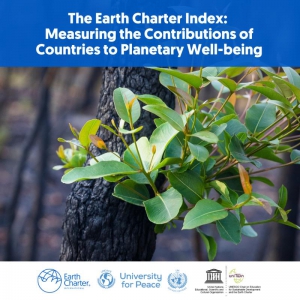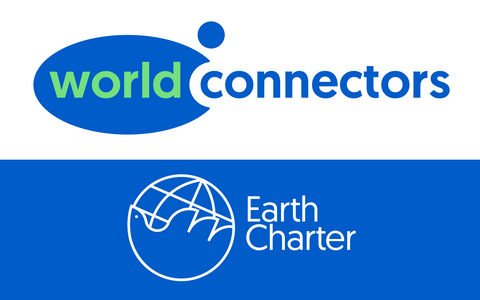Landen zullen binnenkort worden gerangschikt op hun inzet voor het welzijn van de planeet, met de publicatie van nieuwe het Earth Charter Index rapport.

Persbericht, 15 september 2021
While countries use GDP to measure economic growth and Human Development Index, Happiness Index, or other similar indexes to measure human development and well-being, they are not looking at their contributions to planetary well-being. The global lockdowns, increase in temperatures, extreme weather events, rapid melting of glaciers and polar caps, and food and water insecurities have caused us to experience the consequences of the breakdown of planetary well-being. As we have already experienced, in the absence of planetary well-being, economic and human well-being are unlikely to be sustained.
The values of respect and care for the community of life, ecological integrity, social and economic justice, and democracy, nonviolence, and peace serve as a guide towards planetary well-being. When these values drive actions and policies in a country, they result in the country’s contributions to planetary well-being. With the aim to expand the focus of our countries on economic and human well-being to one of planetary well-being, Earth Charter International has been working on a proof-of-concept from September 2020 and generated a report of the scores and ranks of the contributions of 216 countries to planetary well-being. The report used indicators that would be impacted, if the values for planetary well-being articulated in the Earth Charter guided actions and policies, to generate an index of the contributions of the countries to planetary well-being.
Mirian Vilela, who has been championing the Earth Charter for over 25 years, states: “In 1934 Simon Kuznets introduced the concept of GDP which has influenced policymaking to focus on economic growth as a measure of progress. In 1990, the United Nations Development Programme published the first Human Development Index (HDI) that has driven human well-being as a measure of progress. We see the Earth Charter Index as a means to expand this narrative to planetary well-being.”
Anupam Saraph, a world-renowned systems scientist who leads this research at Earth Charter International, says: “Indexes influence decisions, national policies, individual behavior and shape our perception. How we define and measure ‘progress’ impacts how we make ‘progress’. Knowing their contributions to planetary well-being will help countries to recognize and respond to their contributions towards the well-being of our shared planet.”
The country scores will also provide a practical way to recognize the presence of values in a country that drive its actions and policies in a way to contribute to planetary well-being. It also serves as an alternate measure of progress, expanding the narrative of progress to be inclusive of the entire planet and the greater community of life.
“In June 2022, this new Index will be launched as part of the first annual Report of Contributions of Countries to Planetary Well-being on occasion of the 30th Anniversary of the Rio-92 Earth Summit. This effort seeks to offer a new angle and to foster a narrative on the importance of Planetary Well-being and our shared responsibility to contribute towards that,” says Mirian Vilela.
“We believe that the best way to recognize, understand, and value a new idea is to fully engage and align with it. We have, therefore, made an open call to individuals and institutions to join us and participate to help build a narrative of planetary well-being,” adds Anupam Saraph.
Participation offers a unique way to be part of an effort to expand our understanding of planetary well-being and consider the actions and policies that can significantly contribute towards planetary well-being. Details for participation are available on Earth Charter International’s website.
Key insights received will be especially reflected in the Earth Charter International’s Report on Contributions of Countries to Planetary Well-being to be released in June 2022. All contributors will be acknowledged in the Earth Charter International’s Report on Contributions of Countries to Planetary Well-being.
Mikhail Gorbachev, Maurice Strong, Steven Rockefeller, Wangari Maathai, Ruud Lubbers, Princess Basma Bint Talal are part of the generation of visionary leaders behind the Earth Charter movement; we need to engage a new generation of leaders and activists committed to social transformation to carry forward this original idea of a planetary ethic (an Earth ethic), to embrace (and champion) the idea of planetary well-being.
About Earth Charter International
The Earth Charter project began as a United Nations initiative. The need of drafting the Earth Charter was articulated by then Secretary General Boutros Boutros Ghali at the 1992 Rio Earth Summit (United Nations Conference on Environment and Development). He was following up on the recommendation made by the World Commission on Environment and Development (WCED), chaired by Gro Harlem Brundtland, in their report Our Common Future (1987).
In 1994, Maurice Strong (Secretary-General of the Rio Earth Summit) and Mikhail Gorbachev, working through organizations they each founded, launched an initiative to develop an Earth Charter as a civil society initiative. After years of research, consultation and drafting process, the Earth Charter Commission with co-chairs from each continent: Amadou Toumani Touré, Kamla Chowdhry, Mikhail Gorbachev, Mercedes Sosa, and Maurice F. Strong launched the Earth Charter on 29 June 2000 at The Peace Palace in The Hague in the presence of Queen Beatrix of The Netherlands.
Earth Charter International is the organization that coordinates the Earth Charter global movement and functions from the United Nations mandated University for Peace campus in Costa Rica.
For more information, contact: [email protected]
Social Media: Twitter: @earthcharter Linkedin: https://www.linkedin.com/company/earth-charter-international-secretariat/
Facebook: https://www.facebook.com/EarthCharterInternational/
Instagram: @earthcharterinternational
YouTube: https://www.youtube.com/user/ECInternational


